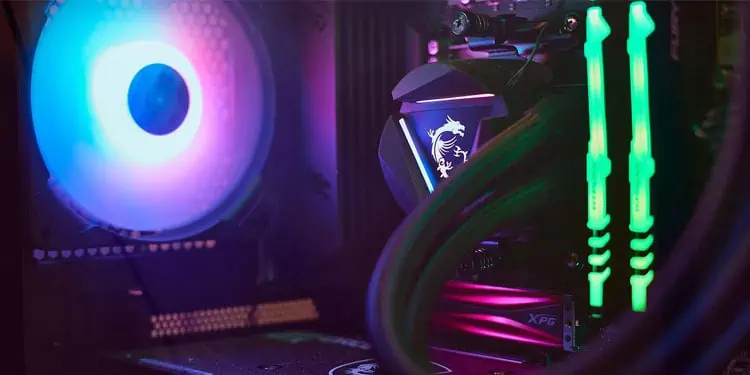Gamers usually install RGB fans to give a futuristic look to their PC. However, RGB on your fans is notoriously known to stop working after prolonged use, making your setup feel out of sync.
Besides this, an issue with internal cabling, Faulty RGB controller are only some reasons RGB on your fan is not working.
In this article, we have discussed a few of the things that may have caused the RGB in fans to stop working, along with the necessary steps to fix them.
Why are My RGB Fans Not Lighting Up?
The first thing you should check when the RGB on your fans does not work is if the motherboard supports RGB. Static RGB light will work on any motherboard, whereas the Addressable RGB light will not work on all motherboards unless it has a 3-pin 5V RGB header.
Besides a motherboard not supporting RGB, here are some other common reasons a fan’s RGB is not working.
- Faulty RGB controller
- The motherboard does not support RGB
- Broken Wires
- PSU is not supplying enough power
- RGB fan connector not connected to the correct fan header on the motherboard
- Physical damage
How to Fix if your RGB Fans Are Not Lighting Up?
The first thing you can try when your fan’s RGB does not work is restart your computer. Sometimes, your RGB may not get sufficient power for it to light up due to power management issues. If restarting does not fix the issue, try the following solutions.
Check if the Motherboard Supports RGB
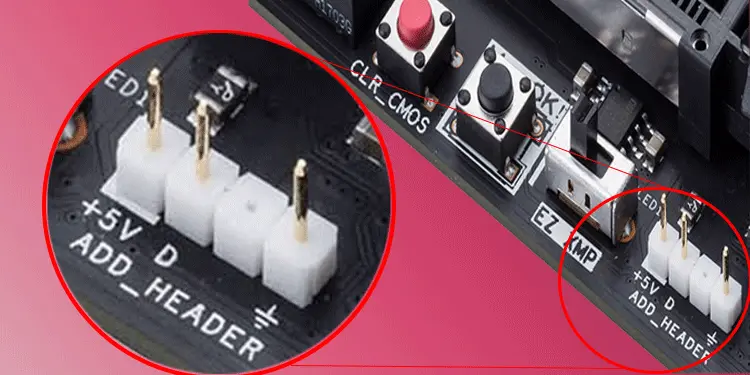
If you start your system for the first time and see that the ARGB (Addressable RGB) light does not turn on, it can be due to the motherboard. Some older motherboards may not support Addressable RGB lights.
ARGB fans will have two cables you need to connect to the motherboard. One powers the fan, and the other powers the RGB. The cable that powers the RGB should be connected to the 3-pin 5V RGB header on the motherboard. And the cable that powers the fans goes in SYS_FAN.
So when you plug in the ARGB fans to the SYS_FAN header on the motherboard, the fan might spin, but the RGB light will not turn on.
To check if your motherboard supports ARGB lights, search for writings ADD_HEADER/ JRAINBOW. If you have trouble finding these writing, please refer to the motherboard’s user manual.
Change RGB Controller
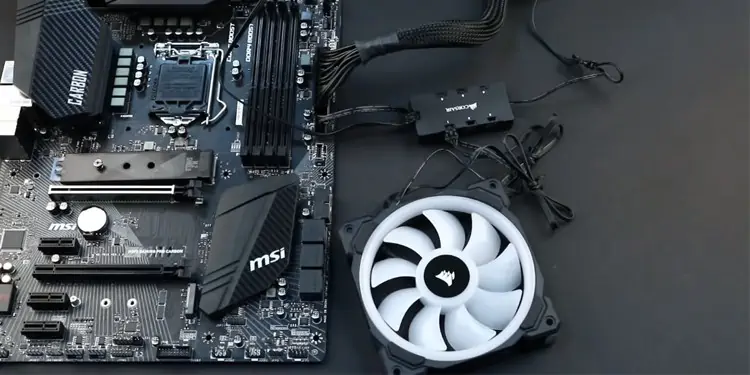
Static RGB fan uses a controller to connect to one another. This allows the user to control fan speeds and RGB colors. If you have a faulty static RGB controller, it can stop your CPU fan or the RGB.
Try connecting the wire from the RGB fan directly to the motherboard to check if the RGB lights up. If it does turn on, you might want to change the RGB fan controller. In case it does not turn on, try other solutions to fix the issue.
Reconnect RGB Fan
Sometimes a loose wire may be the reason the RGB on your fan stops working. Try removing the cable that connects the RGB fans to the motherboard.
Depending on the type of RGB fan, there are different ways you can connect it to the motherboard. Therefore, when removing and reconnecting the wire, make sure you insert the cable the right way.
Polarity also should match when connecting the RGB connector to the motherboard. So inserting them the wrong way can cause the RGB to malfunction.
Use Different RGB Header
You should connect the ARGB cable on the fan to the 3-pin 5V header on the motherboard. If this header is faulty, the RGB on your fan will not work.
Your motherboard may have multiple 3-pin 5V headers. If it does, try connecting the ARGB connector to a different header.
However, if you have a static RGB fan, try connecting it to a different system fan header on your motherboard.
Check the Fans Wire For Damage
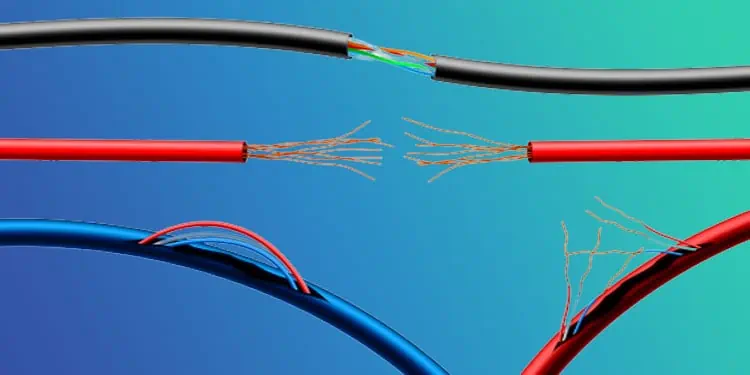
In Addressable RGB fans, you may have noticed the two cables connected to the fan. Check the wire that connects to the 3-pin 5V RGB header on your motherboard for any damages.
Broken wire or visible damage may be the reason your fan’s RGB might not be working. If that’s the case for you, you might need to replace the entire RGB fan.
Check the Power Supply
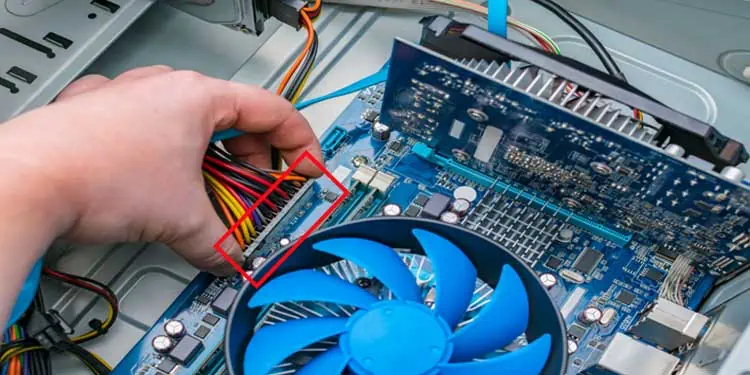
An issue with the PSU can be the reason hardware stops functioning. Loose cable from the power supply, insufficient power from the PSU, or an old PSU can cause connected hardware to stop functioning.
Try reseating the 24-pin cable which connect the PSU to the motherboard. If this does not work, use a different PSU to check if the RGB turns on.
Reset BIOS
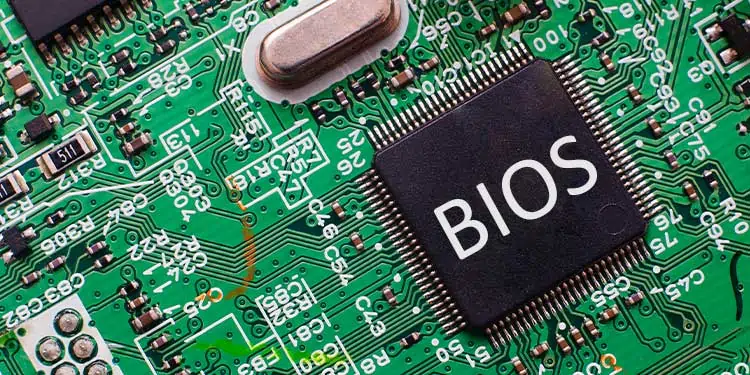
You can control your fan’s RPM (Rotation Per Minute) using the BIOS. If you have recently changed the fan’s RPM through the BIOS, it may stop the RGB from lighting up. Try reverting the RPM to previous settings.
If you do not know the default RPM, you can reset the BIOS. Resetting the BIOS will revert all BIOS settings to default.
Replace the Fan
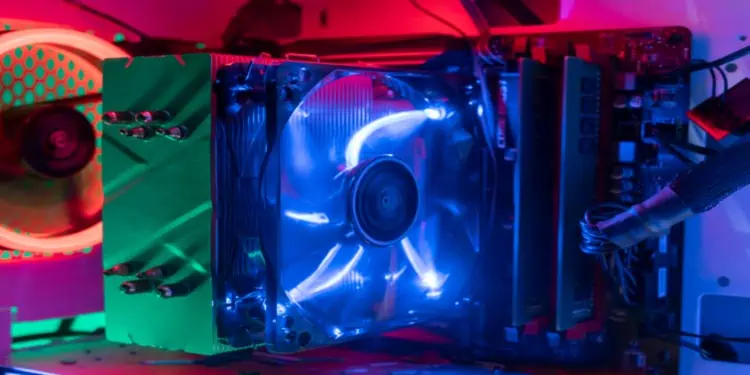
Finally, if nothing works, it can be that the LED lights on your fan are damaged. Although the LED lights on the RGB fans rarely get damaged, there is a possibility of them being faulty. Besides this, if the RGB fan has recently suffered heavy physical damage, it can stop the RGB from working.
Try replacing the RGB fans to check if it fixes the issue. However, make sure that you connect the RGB fans to the right headers.
Related Question
Why Are My RGB Fans Not Spinning?
If the RGB on your RGB fan lights up, but the fan does not spin, it can be that the fan connector is not connected to the motherboard. Using an ARGB fan, you need to connect two wires from the RGB fan to the motherboard.
You must connect the RGB wire to the RGB header and the fan cable to the SYS_FAN header on your motherboard. If it does not work, try reseating the fan header cable.
How to Connect RGB Fans?
You can get two types of RGB fans on the market, ARGB (Addressable RGB) and static RGB fans. ARGB fans come with two wires attached to them. Connect the RGB wires to the 3-pin 5V header on your motherboard and the fan connector to the SYS_FAN or CPU_FAN header depending on the fan.
First, connect the wire from the fan to the connector to connect the static RGB fans. Now connect this connector to the motherboard.

